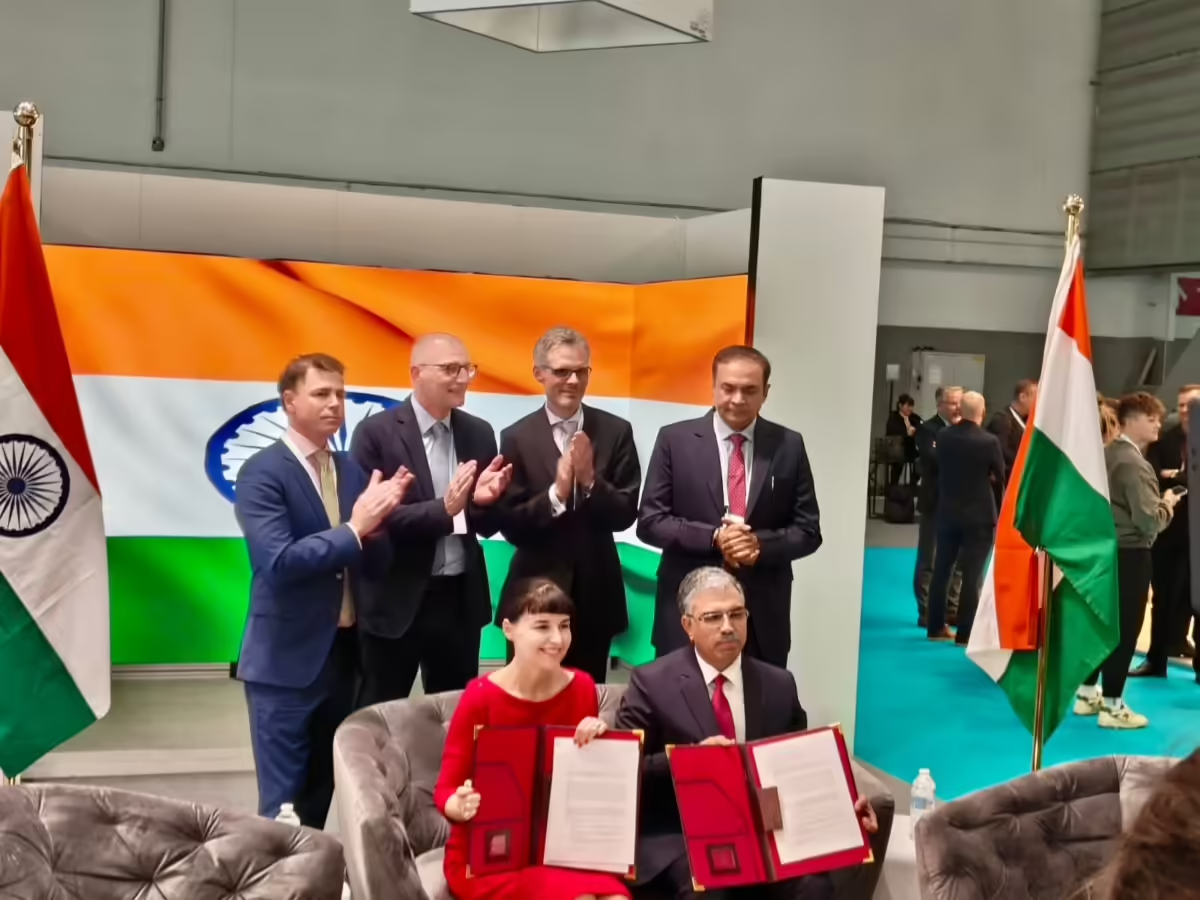Solar Energy Corp. of India (SECI) has signed a memorandum of understanding (MoU) with Germany-headquartered H2Global Stiftung to establish a collaborative framework to promote green hydrogen initiatives. The collaboration will focus on enhancing knowledge exchange on market-based mechanisms and fostering cooperation between India and importing countries.
“This collaboration offers India the opportunity to work on joint tender design concepts, particularly in structuring joint tenders that aligns with India’s ambition to become export hub of Green Hydrogen and its derivatives. The cooperation may provide valuable insights into global hydrogen market dynamics, including trade logistics and stakeholder engagement, which can be instrumental in furthering India’s green hydrogen initiatives,” stated SECI.
H2Global Stiftung (H2Global) is a legal and non-profit foundation under German civil law. It aims to accelerate the emergence of markets for clean hydrogen and other low-emission fuels globally through market-based instruments.
SECI is also the implementing agency for many of the Government of India (GoI) initiatives under the Strategic Interventions for Green Hydrogen Transition (SIGHT) program under the National Green Hydrogen Mission. SECI has issued tenders for green hydrogen production, electrolyser manufacturing and for green ammonia production.
The European Commission, Austria, Lithuania, and Spain have announced new financial support for developing renewable hydrogen. The three member states will participate in the “auctions-as-a-service” scheme as part of the second European Hydrogen Bank auction, launched on Dec. 3. “In addition to the €1.2 billion ($1.3 billion) in EU funding from the Innovation Fund, the three EU member states will deploy over €700 million in national funds to support renewable hydrogen production projects located in their countries,” said the European executive body. “The total funding mobilized by the renewable hydrogen auction will therefore be around €2 billion.”
Uniper has selected Electric Hydrogen as its exclusive partner to design a 200 MW PEM electrolyzer plant for the Green Wilhelmshaven project in Northern Germany. Electric Hydrogen, which began preliminary front-end engineering design work for the project in October 2024, explained that the production plant will work together with the nearby hydrogen import terminal. “Electric Hydrogen’s low-cost 100 MW electrolyzer plants are available for deployment in the European Union in 2026,” said the US company.
Sunfire will deliver 50 MW of electrolyzer capacity to Ren-Gas’s e-methane plant in Tampere, Finland. The German company said the equipment delivery will consist of five 10 MW pressurized alkaline electrolysis modules. Ren-Ga plans to start building in 2025 and expects commercial operation in 2027.
Hystar, together with partners ABB, Equinor, Gassco, and Yara Clean Ammonia, has officially opened the HyPilot project, an in-field demonstration of 1 MW containerized PEM electrolyzer at the Kårstø Gas Processing Plant in Rogaland, Norway. Hystar recently secured a €26 million grant from the EU Innovation Fund so it can implement its automated GW factory, with an annual capacity of 1.5 GW when the factory goes into operation in 2027. The annual production capacity could scale to 4.5 GW by 2031, said the partners.
Flexens has published a report with Lhyfe and Stockholm University on the “BOxHy” project, setting the stage for a six-year offshore oxygen injection pilot that is expected to launch in a few months. Lhyfe said in an emailed note that the “partners also welcome the growing interest of scientists, industry, and institutions in the important problem of ocean “suffocation” (deoxygenation) and the option of reoxygenation.”
Syensqo has launched a fluoro-ionomer produced with its proprietary new non-fluorosurfactant (NFS) technology. “The new grade is commercially available worldwide and is intended for use in select hydrogen-related applications,” said the Belgian materials producer. In 2022, it announced plans to manufacture nearly 100% of fluoropolymers without fluorosurfactants by 2026.
This content is protected by copyright and may not be reused. If you want to cooperate with us and would like to reuse some of our content, please contact: editors@pv-magazine.com.









By submitting this form you agree to pv magazine using your data for the purposes of publishing your comment.
Your personal data will only be disclosed or otherwise transmitted to third parties for the purposes of spam filtering or if this is necessary for technical maintenance of the website. Any other transfer to third parties will not take place unless this is justified on the basis of applicable data protection regulations or if pv magazine is legally obliged to do so.
You may revoke this consent at any time with effect for the future, in which case your personal data will be deleted immediately. Otherwise, your data will be deleted if pv magazine has processed your request or the purpose of data storage is fulfilled.
Further information on data privacy can be found in our Data Protection Policy.